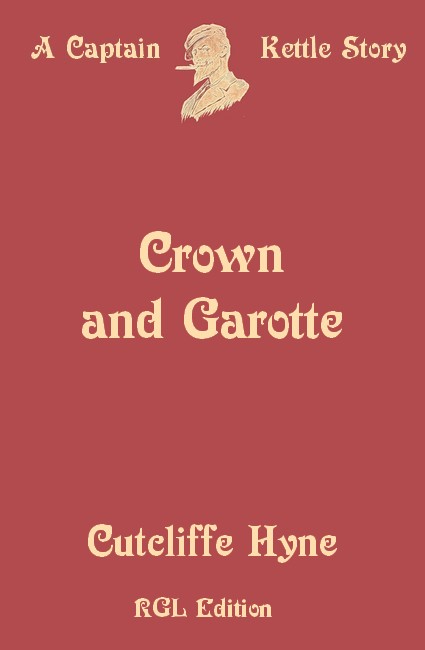
RGL e-Book Cover 2019©

RGL e-Book Cover 2019©

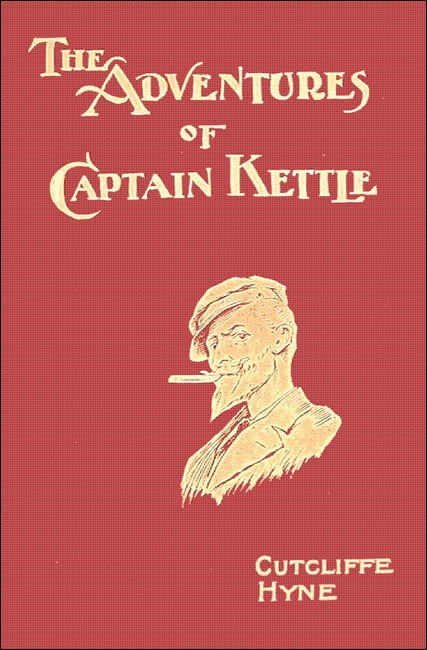
The Adventures of Captain Kettle, 1898, with "Crown And Garotte"
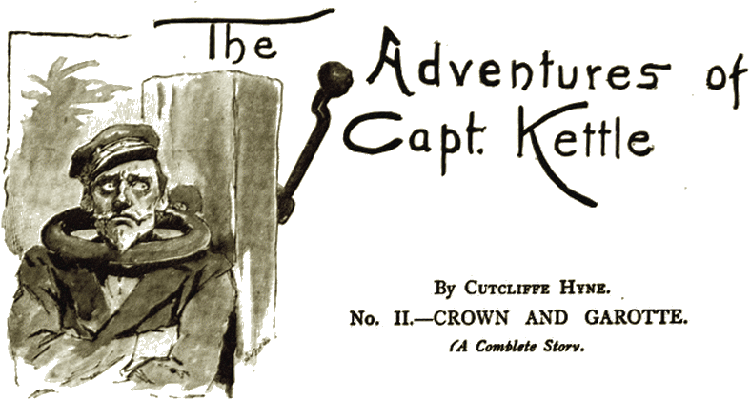
"WE will garotte el Señor Kettle with due form and ceremony," said the mulatto, with an ugly smile. "The saints must have sent us this machine on purpose." He threw away the cigarette stump from his yellow fingers, and began to knot a running bowline on the end of a raw hide rope. "I will do myself the honour of capturing him. He covered me with that revolver of his this morning, and put me to shame before the men. I have not forgotten."
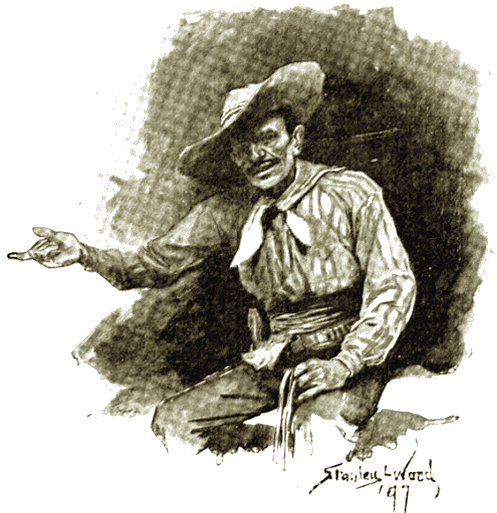
The mulatto.
"And the other Englishman?" said the ex-priest. "He fought well for us in the morning. He is brave."
"And so is far too dangerous to be left alive, padre, after we garotte the sailor."
"My dear Cuchillo," said the ecclesiastic, "you are so abominably bloodthirsty. But I suppose you are right. I will come with you, and if the man shows trouble, I will shoot him where he sits." He and the mulatto got up as he spoke, and the other men rose also, and the six of them left the ingenio silently on the side away from the camp. The jungle growths of the ruined plantation swallowed them out of sight. They held along their way silently and confidently, like men well skilled in woodcraft. With primitive cunning they had arranged to make their attack from the rear.
The noise of their chatter ceased, and from the distance there went up into the hot tropical night faint snatches of the "Swanee River," sung by a Louisiana negro, who had grown delirious from a wound.
In the meanwhile the two Englishmen were taking their tobacco barely a couple of hundred yards away. They had built a small fire of green wood, and were sitting in the alley of smoke as some refuge from the swarming mosquitos; and the conversation ran upon themselves and their own prospects.
"I don't want to mess about with a crown," Captain Kettle was saying. "A cheese-cutter cap's good enough for me; or, seeing that Cuba's hot, a pith helmet might be preferable, if we are going in for luxury." He peered through the smoke wreaths at the camp of revolutionists, a naked bivouac chopped from amongst the canes, and strewn with sleeping men who moaned in their dreams. The ruined ingenio at the further side had its white walls smeared with smoke. The place ached with poverty and squalor.
"Not that there seems much luxury here," he went on. "These beauties haven't a sound pair of breeches among them, and if it wasn't for the rifles and ammunition we brought ashore from the poor old Sultan, sir, I'd say they'd just starve to death before they kicked the Spaniards out of the island. But if ugliness means pluck, there should be none better as fighting men; and when we get to bossing them properly, you'll see we shall just make this revolutionary business hum. You are going to stay on and help, Mr. Carnforth?"
The big man in the shooting coat gave a rueful laugh. "You've got my promise, Kettle. I don't see any way of backing out of it."
"I thank you for that, sir," said the sailor with a bow. "When I come to be formally made King of these Cubans, you shall find I am not ungrateful. I am not a man to neglect either my friends or my enemies.
"You shall sign on as Prime Minister, Mr. Carnforth, when we get the show regularly in commission, and I'll see you make a good thing out of it. Don't you get the notion it'll be a bit like the dreary business you were used to in Parliament in England. Empty talk is not to my taste, and I'll not set up a Parliament here to encourage it. I'm going to hold a full king's ticket myself, and it won't do for any one to forget it."
"You seem very anxious for power, Captain."
"It's a fact, sir," said the other with a sigh. "I do like to have the ordering of men. But don't you think that's the only reason I'm taking on with this racket. I'm a man with an income to make, and I'm out of a berth elsewhere. I'm a man with a family, sir."
"I am a bachelor," said Carnforth, "and I'm thanking heaven for it this minute. Doesn't it strike you, Captain, that this is no sort of a job for a married man? Can't you see it's far too risky?"
"Big pay, big risk; that's always the way, sir, and as I've faced ugly places before and come out top side, there's no reason why I shouldn't do it again here. Indeed, it's the thought of my wife that's principally pushing me on. During all the time we've been together, Mr. Carnforth, I've never been able to give Mrs. Kettle the place I'd wish.
"She was brought up, sir, as the daughter of a minister of religion, and splendidly educated; she can play the harmonium and do crewel work; and, though I'll not deny I married her from behind a bar, I may tell you she only took to business from a liking to see society." He looked out dreamily through the smoke at the fireflies which were winking across the black rim of the forest.
"I'd like to see her, Mr. Carnforth, with gold brooches and chains, and a black satin dress, and a bonnet that cost twenty shillings, sitting in Government House, with the British Consul on the mat before her, waiting till she chose to ask him to take a chair and talk She'd fill the position splendidly, and I've just got to wade in and get it for her."
The little man broke off and stared out at the fireflies, and Carnforth coughed the wood-smoke from his lungs and rammed fresh tobacco into his pipe. He was a man with a fine sense of humour, and he appreciated to the full the ludicrousness of Kettle's pretensions. The sailor had run a cargo of much wanted contraband of war on to the Cuban beach, had sunk a Spanish cruiser in the process, and had received effusive thanks.
But he had taken the florid metaphor of the country to mean a literal offer, and when in their complimentary phrase they shouted that he should be king, a king from that moment he intended to be. The comedy of the situation was irresistible.
But at the same time, Mr. Martin Carnforth was a man of wealth, and a man (in England) of assured position; and he could not avoid seeing that by his present association with Captain Owen Kettle, he was flirting with ugly tragedy every moment that he lived. Yet here he was pinned, not only to keep in the man's society, but to help him in his mad endeavours.
He would gladly have forfeited half his fortune to be snugly back in St. Stephen's, Westminster, clear of the mess; but escape was out of the question; and, moreover, he knew quite well that trying to make Kettle appreciate his true position would be like an attempt to reason with the winds or the surf on an ocean beach. So he held his tongue, and did as he was bidden. He was a man of physical bravery, and the rush of actual fighting that morning had come pleasantly to him.
It was only when he thought of the certain and treacherous dangers of the future, and the cosy niche that awaited him at home in England, that his throat tickled with apprehension, and he caressed with affectionate fingers the region of his carotids. And if he had known that at that precise moment the ex-priest and the mulatto they called el Cuchillo, and the others of the insurgent leaders, were stalking him with a view to capture and execution, it is probable that he would have felt even still more disturbed.
"We did well in that fight this morning," said Kettle presently, as he drew his eyes away from the light-snaps of the fireflies, and shut them to keep out the sting of the wood-smoke. "You've been shot at before, sir?"
"Never," said Carnforth
"You couldn't have been cooler, sir, if you'd been at sea all your life, and seen pins flying every watch. Do you know, I've been thinking it over, and I'm beginning to fancy that perhaps our black and yellow mongrels weren't quite such cowards as I said. I know they did scuttle to the bushes like rabbits so soon as ever a gun was fired; but then their business is to shoot these Spanish soldiers and not get shot back, and so, perhaps, they were right to keep to their own way.
"Anyway, we licked them, and that means getting on towards Mrs. Kettle's being a queen. But that murdering the wounded afterwards was more than I can stand, and It has got to be put a stop to."
"You didn't make yourself popular over it."
"I am not usually liked when I am captain," said Kettle grimly.
"Well, skipper, I don't, as a rule, agree with your methods, as you know, but here I am with you all the way. Your excellent subjects are a great deal too barbarous for my taste."
"They are holy brutes, and that's a fact," said Captain Kettle, "and I expect a good many of them will be hurt whilst I'm teaching them manners. But they've got to learn this lesson first of all: they're to treat their prisoners decently, or else let them go, or else shoot them clean and dead in the first instance whilst they're still on the run. I am a man myself, Mr. Carnforth, that can do a deal in hot blood; but afterwards, when the poor brutes are on the ground, I want to go round with sticking plaster, and not a knife to slit their throats."
"It will take a tolerable amount of trouble to drum that into this crew. A Spaniard on the war-path is not merciful; an African is a barbarian; but make a cross of the two (as you get here) and you turn out the most unutterable savage on the face of the earth."
"They will not be taught by kindness alone," said Captain Kettle, suggestively. "I've got heavy hands, and I shan't be afraid to use them. It's a job," he added with a sigh, "which will not come new to me. I've put to sea with some of the worst toughs that ever wrote their crosses before a shipping master, and none of them can ever say they got the top side of me yet."
He was about to say more, but at that moment speech was taken from him. A long raw-hide rope suddenly flickered out into the air like a slim, black snake; the noose at its end for an instant poised open-mouthed above him; and then it descended around his elbows, and was as simultaneously plucked taut by unseen hands behind the shelter of the jungle. Captain Kettle struggled like a wild cat to release himself, but four lithe, bony men threw themselves upon him, twisted his arms behind his back, and made them fast there with other thongs of raw hide.
Carnforth did nothing to help. At the first alarm, that burly gentleman had looked up and discovered a rifle muzzle, not ten feet off, pointing squarely at his breast. The voice of the ex- priest came from behind the rifle, and assured him in mild, unctuous tones that the least movement would secure him a quick and instant passage to one or other of the next worlds. And Martin Carnforth surrendered without terms. When the four men had finished their other business, they came and roped him up also.
The mulatto strode out from the cover and flicked the ashes of a cigarette into Kettle's face. "El rey," he said, "de los Cubanos must have his power limited. He has come where he was not wanted, he has done what was forbidden, and shortly he will taste the consequences."
"You gingerbread-coloured beast," retorted Captain Kettle; "you shame of your mother, I made a big mistake when I did not shoot you in the morning."
The mulatto pressed the lighted end of his cigarette against Kettle's forehead. "I will trouble you," he said, "to keep silence for the present. At dawn you will be put upon trial, and then you may speak. But till then (and the sun will not rise for another three hours yet), if you talk, you will earn a painful burn for each sentence.
"You are a man accustomed to having your own way, Señor; I am another; and, as at present I possess the upper hand, your will has got to bend to mine. The process, I can well imagine, will be distasteful to you. It was distasteful to me when I looked down your revolver muzzle over the affair of those prisoners. But I do not think you will be foolish enough to earn torture uselessly."
Kettle glared, but with an effort held his tongue. He understood he was in a very tight place. And for the present the only thing remaining for him was to bide his time. He quite recognised that he was in dangerous hands. The mulatto was a man of education, who had been brought up in an American college; and who had learned in the States to hate his white father, and loathe his black mother with a ferocity which nothing but that atmosphere could foster.
He was a fellow living on the borderland of the two primitive colours, and his whole life was soured by the pigment in his skin. As a white man he would have been a genius; as a black he would have become a star; but as a mulatto he was merely a suave and brilliant savage, thirsting for vengeance against the whole of the human race. He had entered this Cuban revolution through no taint of patriotism, but merely from the lust for cruelty. By sheer daring and ability he had raised himself from the ranks to supreme command of the revolutionists, and he was not likely to let the situation slip from his fingers for even a few short hours, without exacting a bitter retribution.
Carnforth lifted up his voice in expostulation, but was quick silenced by the promise of branding from the cigarette end if he did not choose to hold his tongue. Quiet fell over the group. The only sounds were scraps the "Swanee River," sung by the wounded negro in his delirium from somewhere in the distance—
"Still longing for the old plantation.
And for the old folks at home."
came the words in a thin quavering tenor, and Carnforth, with
a sigh, thought how well he could endorse them.
The first glow of morning saw the camp aroused, and half an hour later the Court was ranged. The self-styled judges sat under the white-washed piazza of the ruined house; the motley troops faced them in an irregular ring twenty yards away; and the two prisoners, with an armed man to guard each, stood on the open ground between.
El Cuchillo was himself principal spokesman, and proceedings were carried on in Spanish and English alternately. The crime of Captain Kettle was set forth in a dozen words. He had stopped the rightful execution of prisoners, and had let them go free.
"You had no place to gaol them," said Carnforth in defence.
The mulatto pointed a thin yellow finger at the sun-baked ground in front of the piazza. "We have the earth," he said. "Give them to the earth, and she will keep them gaoled so fast that they will never fight against us more. It is a war here to the knife on both sides. The Spanish troops kill us when they catch, and we do the like by them; it is right that it should be so. We do not want quarter at their hands; neither do we wish them to remain alive upon Cuba. Three Spanish soldiers were ours a few hours ago. Our cause demanded that their lives should have been taken away. And yet they were set free."
"Yes," broke in Kettle, "and, by James! that's a thing you ought to sing small about. Here's you: six officers and a hundred and fifty men, all armed. Here's me: a common low-down, foul-of- his-luck Britisher, with a vinegar tongue and a thirty-shilling pistol. You said the beggars should be hanged; I said they shouldn't; and, by James! I scared the whole caboodle of you with just one-half an ugly look, and got my own blessed way. Oh, I do say you are a holy crowd."
Carnforth stamped in anger. It seemed to him that this truculent little sailor was deliberately inviting their captors to murder the pair of them out of hand. He understood that Kettle was bitterly disappointed at having his bubble about the kingship so ruthlessly pricked, but with this recklessness which was snatching away their only chance of escape, he could have no sympathy. He was unprepared, however, for his comrade's next remark.
"Don't think I'd any help from Mr. Carnforth here. He's a Member of Parliament in London, and is far too much of a gentleman to concern himself with your fourpenny ha'penny matters here. He warned me before I began, that being king of the whole of your rotten island wasn't worth a dish of beans; but I wouldn't believe him till I'd seen how it was for myself.
"I'm here now through my own fault; I ought to have remembered that niggers, and yellow-bellies, and white men who have forgotten their colour, could have no spark of gratitude. I'll not deny, too, that I got to thinking about those fire-flies, and so wasn't keeping a proper watch; but here I am, lashed up snug, and I guess you're going to make the most of your chance. By James! though, if you weren't a pack of cowards, you'd cast me adrift, and give me my gun again!"
"Speaking as a man of peace," said the ex-priest, "I fancy you are safest as you are, amigo."
"I'd be king of this crowd again inside three minutes if I was loose," retorted Kettle.
El Cuchillo snapped his yellow fingers impatiently. "We are wasting time," he said. "Captain Kettle seems still to dispute my supreme authority. He shall taste of it within the next dozen minutes; and if he can see his way to resisting it, and asserting his own kingship, he has my full permission to do so. Here, you: go into the ingenio, and bring out that machine."
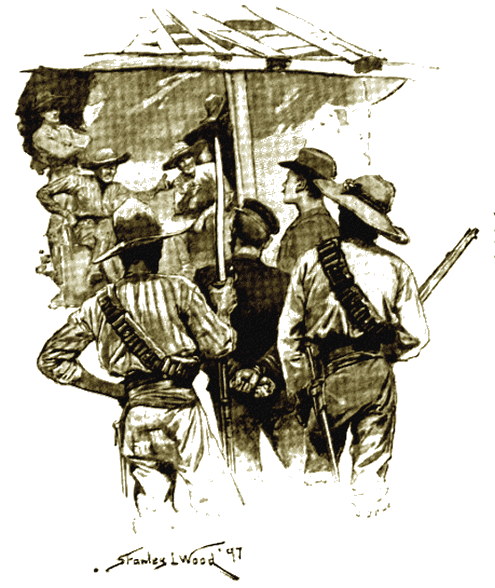
"Captain Kettle seems still to dispute my supreme authority."
A dozen ragged fellows detached themselves from the onlookers, and went through a low stone doorway into a ruined sugar house. In a couple of minutes they reappeared, dragging with noisy laughter a dusty cumbersome erection, which they set down in the open space before the piazza.
It was made up of a wooden platform on which was fastened a chair and an upright. On the upright was a hinged iron ring immediately above the chair. A screw passed through the upright into the ring, with a long lever at its outside end, on either extremity of which was a heavy sphere of iron. If once that lever was set on the twirl, it would drive the screw's point into whatever the iron ring contained with a force that was irresistible.
The mulatto introduced the machine with a wave of his yellow fingers. "El garrotte," he said. "A mediaeval survival which I did not dream of finding here. Of its previous history I can form no idea. Of its future use I can give a simple account. It will serve to ease us of the society of this objectionable Captain Kettle."
"Great heavens, man," Carnforth broke out; "this is murder."
"Ah," said el Cuchillo, "I will attend to your case at the same time. You shall have the honour of turning the screw which gives your friend his exit. In that way we shall secure your silence afterwards as to what has occurred."
"You foul brute," said Carnforth, with a shout, "do you think I am an assassin like yourself?"
The mulatto took a long draught at his cigarette. "What a horrible country England must be to live in, if all the people there have tongues as long as you two. Señor, if you do not choose to accept my suggestion for pinning you to silence, I can offer you another. Refuse to take your place at the screw, and I promise that you shall be stood up against the wall of this ingenio and be shot inside the minute. The choice stands open before you."
"Mr. Carnforth," said Captain Kettle, "you mustn't be foolish. You must officiate over me exactly as you are asked, or otherwise you'll get shot uselessly. Gingerbread and his friends mean business. And if you still think you're taking a liberty in handling the screw (in spite of what I say) you may fine yourself a matter of ten shillings weekly, and hand it across to Mrs. Kettle. I make no doubt she would find that sum very useful."
"This is horrible," said Carnforth.
"It will be horrible for Mrs. Kettle and my youngsters, sir, if you don't act sensibly and man the lever as Gingerbread asks. If you get planted here alongside of me, I don't know any one at all likely to give them a pension. It would afford me a great deal of pleasure just now, Mr. Carnforth, if I knew my family could still keep to windward of parish relief."
"Of course," said Carnforth with a white face, "I will see your wife and children are all right if I get clear; but it is too ghastly to think of purchasing even my life on these terms."
"You seem slow to make up your mind, Señor," broke in the mulatto. "Allow me to hasten your decision." He gave some directions, and the men who had brought out the garotte took Captain Kettle and sat him on the chair. They opened the iron ring, which screeched noisily with its rusted hinge, and they clasped it, collar-fashion, about his neck. Then they led Carnforth up to the back of the upright, and cast off the lashing from his wrists.
"Now, Señor Carnforth," said the yellow man. "I want that person garotted. If you do it for me, I will give you a safe conduct down to any sea-port in Cuba which you may choose. If I have to set on one of my own men to do the work, you will not have sight to witness it. I will stick you up against that white wall, yonder, and have you shot, out of hand. Now, Señor, I have the honour to ask for your decision."
"Come, sir, don't hesitate," said Captain Kettle. "If you don't handle the screw, remember some one else will."
"That will be a flimsy excuse to remember afterwards."
"You will be paying a weekly fine, and can recollect that carries a full pardon with it."
"Pah!" said Carnforth, "what is ten shillings a week?"
"Exactly," said Kettle. "Make it twelve, sir, and that will hold you clear of everything."
"What feeble, dilatory people you English are," said el Cuchillo. "I must trouble you to make up your mind at once, Señor Carnforth."
"He has made it up," said Kettle, "and I shall go smiling, because I shall get my clearance at the hands of a decent man. I'd have taken it as a disgrace to be shoved out of this world by a yellow beast like you, you shame of your mother."
The mulatto blazed out with fury. "By heavens," he cried, "I've a mind to take you out of that garotte even now and have you burnt."
"And we should lose a pleasant little comedy," said the ex- priest. "No, amigo; let us see the pair of them perform together."
"Go on," said the mulatto to Carnforth.
"Yes," said Kettle in a lower voice. "For God's sake go on and get it over. It isn't very pleasant work for me, this waiting. And you will make it twelve shillings a week, sir?"
"I will give your wife a thousand a year, my poor fellow. I will give her five thousand. No; I am murdering her husband, and I will give her all I have, and go away to start life afresh elsewhere. I shall never dare to show my face again in England or carry my own name." He gripped one of the iron spheres and threw his weight upon the lever. The bar buckled and sprang under his effort, but the screw did not budge.
"Quick, man, quick," said Kettle in a low, fierce voice. "This is cruel. If you don't get me finished directly, I shall go white or something, and those brutes will think I'm afraid."
Carnforth wrenched at the lever with a tremendous effort. One arm of the bar bent slowly into a semi-circle, but the lethal screw remained fast in its socket. It was glued there with the rust of years.
Carnforth flung away from the machine. "I have done my best," he said sullenly to the men on the piazza, "and I can do no more. You have the satisfaction of knowing that you have made me a murderer in intent, if not in actual fact; and now, if you choose, you can stick me up against that wall and have me shot. I'm sure I don't care I'm sick of it all here."
"You shall have fair treatment," said el Cuchillo, "and neither more nor less. You have tried to obey my orders, and Captain Kettle is at present alive because of the garotte's deficiency, and not by your intention." He gave a command, and the men released the iron collar from Kettle's neck. "I will have the machine repaired by my armourer," he said, "and in the meanwhile you may await my pleasure out of the sunshine."
He gave another order, and the men laid hands upon their shoulders and led them away, and thrust them into a small arched room of whitened stone, under the boiler-house of the ingenio. The window was a mere arrow-slit; the door was a ponderous thing of Spanish oak, barred with iron bolts which ran into the stone work; the place was absolutely unbreakable. And there they waited, moodily taciturn.
The silence had lasted a dozen hours, although it was plain that each of the prisoners was busily thinking. At last Kettle spoke.
"If I could only get a rhyme to 'brow,'" he said, "I believe I could manage the rest."
"What?" asked Carnforth.
"I want a word to rhyme with 'brow,' sir, if you can help me."
"What in the world are you up to now?"
"I've been filling up time, sir, whilst we've been here, by hammering out a bit of poetry about those fireflies. I got the idea of it last night, when we saw them flashing in and out against the black of the forest."
"You don't owe them much gratitude that I can see, skipper. According to what you said, if you hadn't been looking at them, you'd have been more on the watch, and wouldn't have got caught."
"Perfectly right, sir. And so this poem should be all the more valuable when it's put together. I'm running it to the tune of 'Greenland's icy mountains,' my favourite air, Mr. Carnforth. I'm trying to work a parallel between those fireflies switching their lights in and out, and a soul, sir. Do you catch the idea?"
"I can't say I do quite."
Captain Kettle rubbed thoughtfully at his beard. "Well, I'm a trifle misty about it myself," he admitted; "but it will make none the worse poetry for being a bit that way, if I can get the rhymes all right."
"'Plough' might suit you," Carnforth suggested.
"That's just the word I want, sir. 'The fields of heaven to plough.' That would be the very occupation the soul of the man I'm thinking about would delight in; something restful and in the agricultural line. I wanted to give him a good time up there. He was due for it," he added thoughtfully, and then he closed his eyes and fell to making further poetry.
Martin Carnforth knew the little ruffian's taste for this form of exercise, but it seemed to him jarringly out of place just then. "I am in no mood for verse now," he commented with a frown.
"I am," said Kettle, and tapped out the metre of a new line with a finger tip upon his knee. "It always takes a set-to with the hands, or a gale of wind, or a tight-corner of some kind, to work me up to poetry at all. And the worse the fix has been, the better I can rhyme. I find it very restful and pleasant, sir, to send my thoughts over a bit of a sonnet after times like these."
"Then you ought to turn out a masterpiece now," said Carnforth, "and enjoy the making of it."
Kettle took him seriously. "I quite agree with you there, sir," he said, and puckered his forehead and went on with his work.
Carnforth did not say any more, but turned again to brooding. Every time he looked at the matter, the more he cursed himself for leaving his snug pinnacle in England. The utmost boon he could have gamed in Captain Kettle's society was not to be caught. Dangers, hardships, and exposures he was discovering are much pleasanter to hear of from a distance, or to read about in a well-stuffed chair by a warm fireside. The actual items themselves had turned out terribly squalid when viewed at first hand.
At last he broke out again. "Look here, skipper," he said, "I'm fond enough of life, but I don't think I want to earn it by playing executioner. I'd prefer to let this rebel fellow parade me and bring out his platoon."
Kettle woke up from his work. "I'm not sweet on wearing the iron collar again, and that's a fact. It's horrible work waiting to have your backbone snapped without being able to raise a finger to interfere. I'm not a coward, Mr. Carnforth, but I tell you it took all the nerve I'd got to sit quiet in that chair without squirming whilst you were getting ready the ceremonial.
"It's no new thing for me to expect being killed before the hour was through. I've had trouble of all kinds with all sorts of crews, but I've always had my hands free and been able to use them, and I will say I've most always had a gun of some sort to help me. I might even go so far as to tell you, sir (and you may kick me for saying it if you like), I've felt a kind of joy regularly glow inside me during some of those kind of scuffles. Yes, sir, that's the kind of animal I am: in hot blood I think no more of being killed than a terrier dog does."
"If there was only a chance of being knocked on the head in hot blood," said Carnforth, "I'd fight like a cornered thief till I got my quietus."
"And Mrs. Kettle would lose her twelve shillings a week if—-By James! sir, here they come for us."
He leapt up from the bench on which he had sat, and whirled it above his head. With a crash he brought it down against the whitened wall of the cell, and the bench split down its length into two staves. He gave one to Carnforth, and hefted the other himself like a connoisseur.
"Now, sir, you on one side of the door and me on the other. They can't reach us from the outside there. And if they want us out of here we've got to be fetched."
Carnforth took up his stand, and shifted his fingers knowingly along his weapon. He was a big man and a powerful one, and the hunger for fighting lit in his eye.
"Horatius Cockles and the other Johnnie holding the bridge," quoth he. "We can bag the first two, and the others will fall over them if they try a rush. What fools they were to untie our wrists and shins! But our fun won't last long. As soon as they find we are awkward, they will go round to the window-slit and shoot us down from there."
"We aren't shot yet," said Kettle grimly, "and I'm wanting to do a lot of damage before they get me. Look out!"
The bolts grated back in the rusty staples, and the heavy door screamed outwards on its hinges. A negro came in, whistling merrily. The two halves of the bench flew down upon his head from either side with a simultaneous crash.
A white man's skull would have crunched like an eggshell under that impact, but the African cranium is stout. The fellow toppled to the ground under the sheer tonnage of the blows, and he lay there with the whistle half frozen on his lips, and such a ludicrous look of surprise growing over his features that Carnforth burst into an involuntary laugh. Kettle, however, was more businesslike. The negro had a machete dangling from his hip, and the little sailor darted out and snatched it from its sheath. He jumped back again to cover with slim activity, and a couple of pistol bullets which followed him made harmless grey splashes on the opposite wall. Then there was a pause in the proceedings, and Carnforth felt his heart thumping noisily against his watch as he waited.
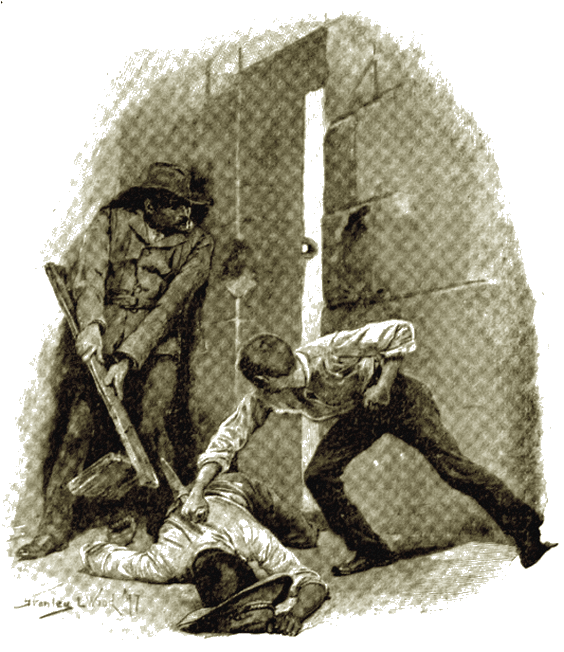
The little sailor darted out and snatched it from its sheath.
Presently a brisk footstep made itself heard on the flagging outside, and the voice of the mulatto leader spoke through the doorway.
"If you come out now, one of you shall be garotted, and the other shall go free. If I have more trouble to fetch you, you shall both be roasted to death over slow fires."
"If—if—if!" retorted Kettle. "If your mother had stuck to her laundry work and married a nigger, she'd have kept a very great rascal out of the world. If I'd the sense of a sheep I'd come to you at once, and my poor wife would have twelve bob a week for life. If you want to talk, you frightened lump of gingerbread, come in here and do it, and don't squall out there like a cat on a garden wall."
The suave voice of the ex-priest made a comment. "Saints deliver us from these Englishmen's tongues. Truly they are not fit to live; but why should we send our terriers into the rat pit? A little careful shooting through the window yonder will soon limit their capers, and if the shooting is carefully done, neither will be any the worst as a roast."
El Cuchillo answered him savagely. "Then do you see to it. The big man you may shoot as you please, but if you kill the sailor, look to yourself. That man is in my debt, and I want him in my hands alive, so that I may pay it."
"Amigo," said the unfrocked priest, "you may trust to my shooting. I will pink him most scientifically in one leg and the right arm, and I will guarantee that you shall get him in perfect condition to have your satisfaction on."
"Do so," said the mulatto, and the other marched briskly away on his rope-soled sandals. But in the meantime Kettle's active brain had formed a plan, and in dumb show he had telegraphed it across to Carnforth at the opposite flank of the doorway.
Of a sudden the pair of them rushed out simultaneously. Kettle handed the machete to his companion, and sprang upon the yellow man with greedy fingers. His feet he kicked away from beneath him, and at the same instant grappled him by the throat. It was a trick he had many a time before played upon mutinous seamen, and he had dragged the mulatto back into the cell almost before the man had time to struggle. Carnforth followed closely upon their heels leaving signatures behind him written redly with the machete.
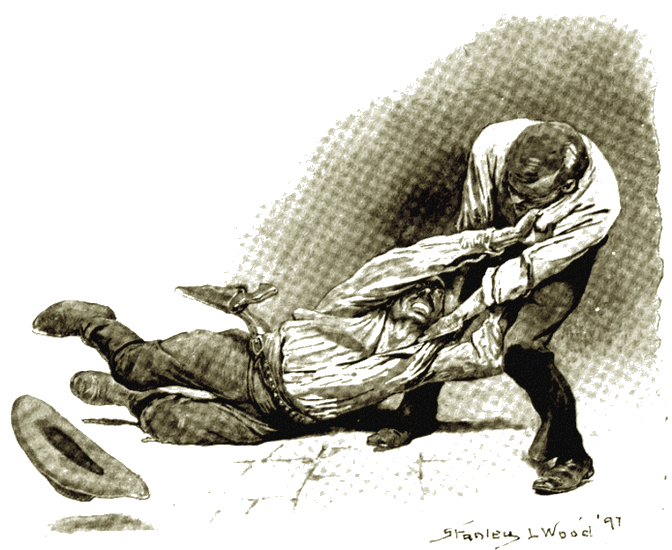
He had dragged the mulatto back into the cell
almost before the man had time to struggle.
Captain Kettle bumped the mulatto's head against the wall as a way of quieting him and keeping his way from dangerous weapons, and then threw him on to the floor. He extracted a revolver and a knife from the man's belt, and looked up to see the face of the ex-priest staring at him from the window. Then he sat himself on the chest of his prisoner, and prepared to treat for terms.
A shot rang out across the bivouac outside, and then another. The man at the window-slit turned away his face. There was a minute's pause, and then a dropping fire began, the sound of it coming from two distinct quarters.
The ex-priest's head went out of sight. It was the last they ever saw of him. Some one outside the doorway shouted "Los Españoles!" and there was the scuffle of bare feet running away and fading into the distance. And, meanwhile, outside the windows the crackle of rifles grew more noisy, and cries rose up of men in pain. The light in the vaulted room grew faintly blue, and the air was soured with powder smoke.
"By James!" said Kettle, "the Spanish regular troops have raided the camp, and the whole lot of them are fighting like a parcel of cats. Hark to the racket. Here's a slice of luck."
"I don't see it," said Carnforth. "If we're out of the fire we're into the frying-pan. Sinking that Spanish warship was an act of piracy, and we shall be strung up if the Dons catch us, without the prelude of a trial. Listen! There's a Maxim come into action. Listen! I wonder which way the fight's going. They're making row enough over it. I'm going to get to the window and have a look."
"It's tempting," said the little sailor wistfully, "but I think, sir, you'd better not. If you're seen we shall be gastados, as they say, anyway. Whereas, if the rebels are licked, the Dons may march off again without knowing we are here. It's a chance. By James! though, I'd like to have a look. Hark to that. They're at hand-grips now. Hear 'em swear. And hear 'em scream."
"Some of them are beginning to run. Hark to that crashing as they're making their way through the cane."
"And hark to those shouts. It's like a lot of cockneys at a fox-hunt."
"These Dagos always yell blue murder when they're in a fight," said Kettle contemptuously.
"The Maxim's stopped," said Carnforth with a frown.
They listened on for awhile with straining ears, and then: "Perhaps that means the rebels have rushed it."
"They may have run. But the Dons ought to be browning the cover if they've cleared the camp. The fools! A Maxim would shoot through half a mile of that cane-jungle."
"Short of ammunition," said Kettle, "or perhaps it's jammed." A bugle shrilled out through the hot air, and its noise came to them there in the hot, dark room. "That means cease fire, and the Spaniards have won. Our mongrels had no bugles. Well, it's been a quick thing I wonder what next!"
There was a dull murmur of many voices. Then orders were shouted, and noise came as of moving men, and a few more scattered shots rang out, most of them answered by cries or groans.
"Hullo?" said Kettle.
A weak voice from beneath him made explanation. "They are shooting their prisoners, Señores—the men who were my comrades. It is the custom—the custom of Cuba."
"So you have concluded to come to life again, have you?" asked the little sailor. "I thought I'd bumped you harder. What do you expect to be done with, eh?"
"I am in your hands," said the mulatto sullenly.
"That's no lie," said Kettle, "and I've a perfect right to kill you if I wish. But I don't choose to dirty my hands further. You've only acted according to your nature. And—when it came to me being able to move, I've beaten you every time. But now we'll have silence, please, for all hands. If those Spaniards are going to search this old sugar house, they'll do it, and up on a string we go the three of us; but there's no need to entice them here by chattering."
Their voices stopped, and the noises from without buzzed on. Of all the trials he had gone through Carnforth felt that waiting to be the most intolerable of all. The Spanish soldiery were looking to their wounds and hunting through the bivouac. Some (to judge from their talk) had gathered round the rusted garotte and were examining it with interest. And a few strolled up to the ruined ingenio, and smoked their cigarettes under its piazza. Any moment the room beneath the boiler house might be peeped upon.
The sun beat down upon the stonework and the heat grew. The voices gradually drew away, till only the hum of the insects remained. And so an hour passed.
Another hour came and went without disturbance, and still another; and then there came the sound of a quavering tenor voice singing a scrap from the "Swanee River" from close outside the walls!
"Oh, take me to my kind ole mudder!
Dere let me live and die."
"That Yankee nigger," said Kettle, in a whisper. "He was wounded and delirious before we came and he's been hidden amongst the cane. They can't have seen him before; but, poor devil, they'll shoot him now."
But no quietening rifle-shot rang out, and wonder grew on the faces of all three. They waited on with straining ears, and Carnforth raised his eyebrows in an unspoken question. Kettle nodded, and the big man rose gingerly to his feet, and peeped from the corner of the window-slit. He turned round with rather a harsh laugh. "The place is empty," he said. "I believe they've been gone these three hours."
Captain Kettle leapt to his feet and made for the door. "Quick," he cried, "or we shall have the rebels back again, and I'll own that I don't want to fight the whole lot of them again just now. We'll leave Gingerbread in here till his friends come to fetch him; and you and I, sir, will slip down to the beach, and get off in one of the old Sultan's quarter-boats."
They passed outside the door, and closed and bolted it after them.
"By the way," said Captain Kettle, "you couldn't happen to think of a rhyme to 'gleam,' could you?"
"No," said Carnforth.
"Well, I'll hammer it out on the road down, and then I'll have finished that sonnet, sir. But never mind poetry just now. I'll say the piece to you when we've got to sea. For the present, Mr. Carnforth, we must just pick up our feet and run."
And so they went off to the quarter-boat, and ten minutes later they were running her down the beach and into the sea.
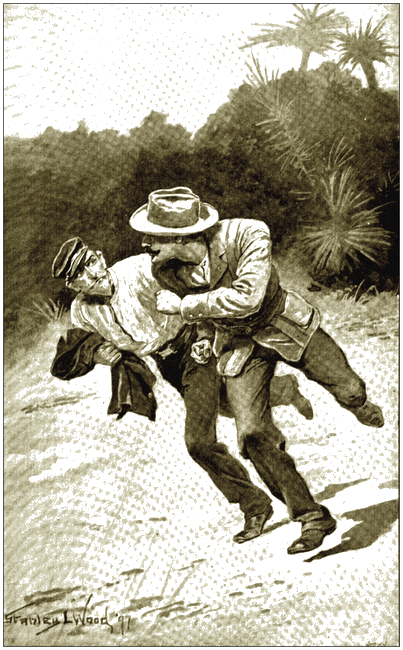
And so they went off to the quarter-boat.